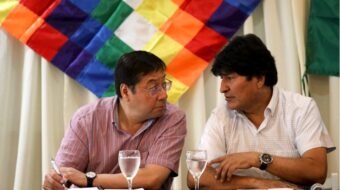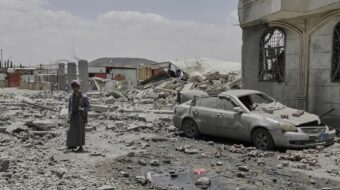In a triumph for African diplomacy, the ruling and opposition parties of Zimbabwe are in the midst of negotiations toward a power-sharing agreement. Despite Zimbabwean opposition calls for his replacement as mediator, South African President Thabo Mbeki succeeded in bringing together President Robert Mugabe and his opponent, Morgan Tsvangirai of the Movement for Democratic Change (MDC), for their first face-to-face talks in a decade.
Major obstacles remain in the negotiations, particularly Mugabe’s possible role in a unity government, but Zimbabweans across the political spectrum expressed relief that the two sides are meeting in Harare. After months of often violent confrontations between government and opposition supporters, Zimbabweans were enthused by a photo of Mugabe, Tsvangirai and MDC splinter-faction leader Arthur Mutambara holding hands and smiling on July 21, when the talks formally were announced.
The negotiators committed to a tight two-week deadline for putting together the agreement. The MDC demands Mugabe step down and the creation of a ‘Transitional Authority’ to monitor new elections. The ruling Zimbabwe African National Union-Patriotic Front (ZANU-PF) calls for the opposition to accept Mugabe as president and an end to western sanctions against Zimbabwe.
The crisis in Zimbabwe began after a first round of elections in December, which was relatively peaceful and declared free and fair by international election observers. Although Tsvangirai received the most votes, he did not pass the 50 percent threshold necessary to avoid a run-off, a result confirmed by independent election monitors. The MDC insisted their leader won outright and declared they would not participate in a run-off, as Tsvangirai spent weeks shuttling around southern Africa trying to persuade neighboring leaders to force Mugabe out of power. The opposition then shifted gears, saying Tsvangirai would stand in the second round, before again deciding to not participate in the run-off only days before the vote because of violence against opposition supporters. This ensured Mugabe’s re-election, analysts said.
The MDC charges 120 of its followers were killed since the first round of elections by state-sponsored campaign of violence against the opposition. The Zimbabwean government denies the charge and points out that supporters of both sides committed violent acts. In fact, last week the BBC reported that MDC members attacked a group of liberation war veterans, who overwhelmingly support Mugabe.
While the electoral violence generally appears to be dissipating, the Zimbabwean economy continues its freefall, as the government recently issued a new 100 billion Zimbabwean dollar note.
Meanwhile, capitalist powers continue their campaign against the Zimbabwean government as both the European Union and the Bush administration enacted new sanctions even as the negotiations were taking place. The latest sanctions come after the United States and Zimbabwe’s former colonial power the United Kingdom were rebuffed by the United Nations Security Council. The sanctions resolution they sponsored in that body was opposed by, among other member countries, South Africa, and vetoed by permanent members Russia and China, two nations that supported Zimbabwe’s anti-colonial struggle in the 1970s.
Sanctions against Zimbabwe means no U.S. firms can conduct business with the organizations targeted, such as the Agricultural Development Bank of Zimbabwe. These sanctions just further the hardship for the people of Zimbabwe without resolving any political issues.
Some African observers believe the capitalist powers seem more interested in punishing and isolating Mugabe rather than promoting dialogue and peace in Zimbabwe.
In many African societies, appeasing both sides and achieving consensus is the customary approach to settling disputes. The South African-mediated talks are an illustration of the renewed commitment to pursuing Pan-Africanist approaches to resolving conflicts within the African Union. Ordinary Zimbabweans are placing their hopes in a successful round of negotiations leading to a national unity government, similar to the recent agreement signed in Kenya ending a violent upheaval there following a disputed election last December.









